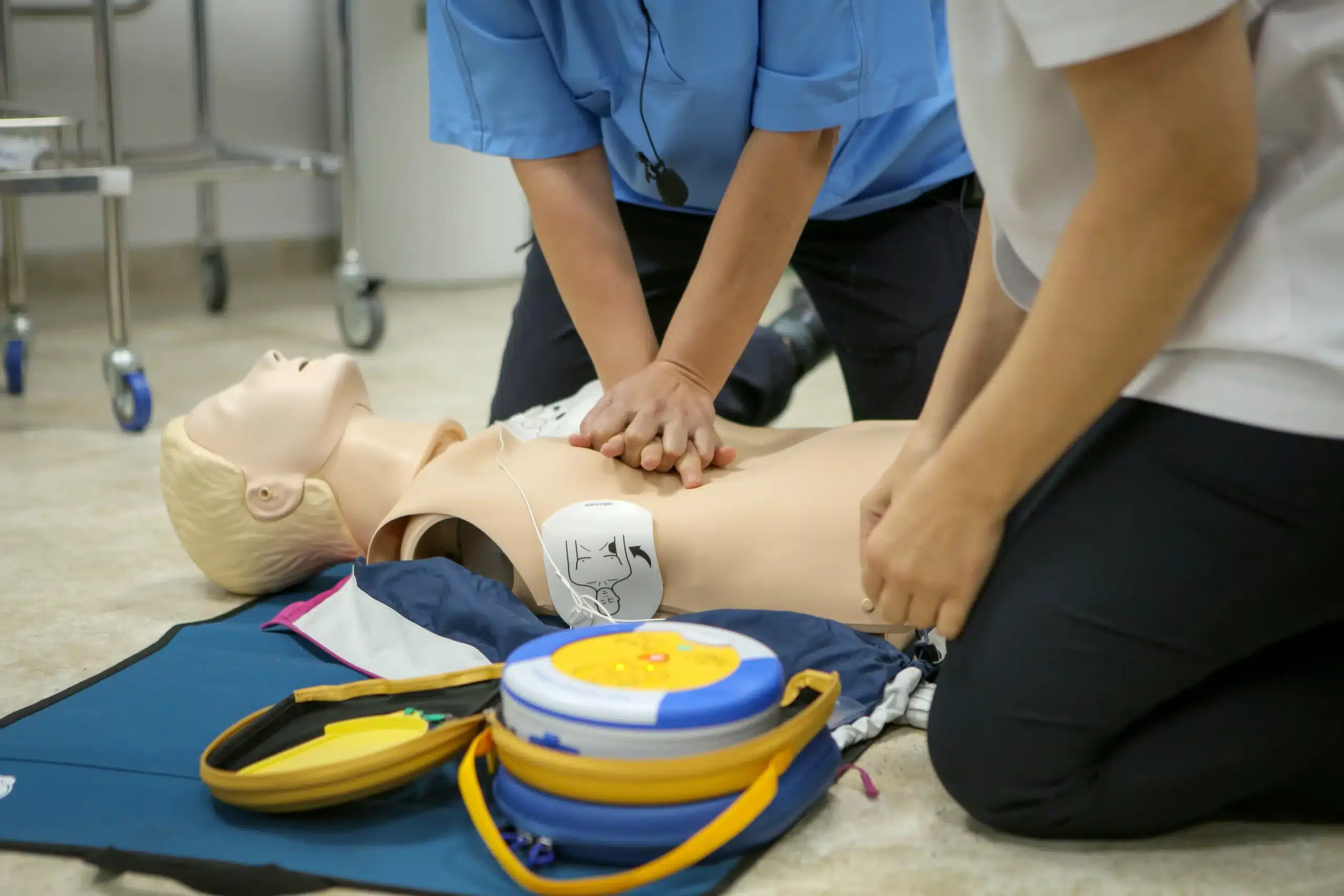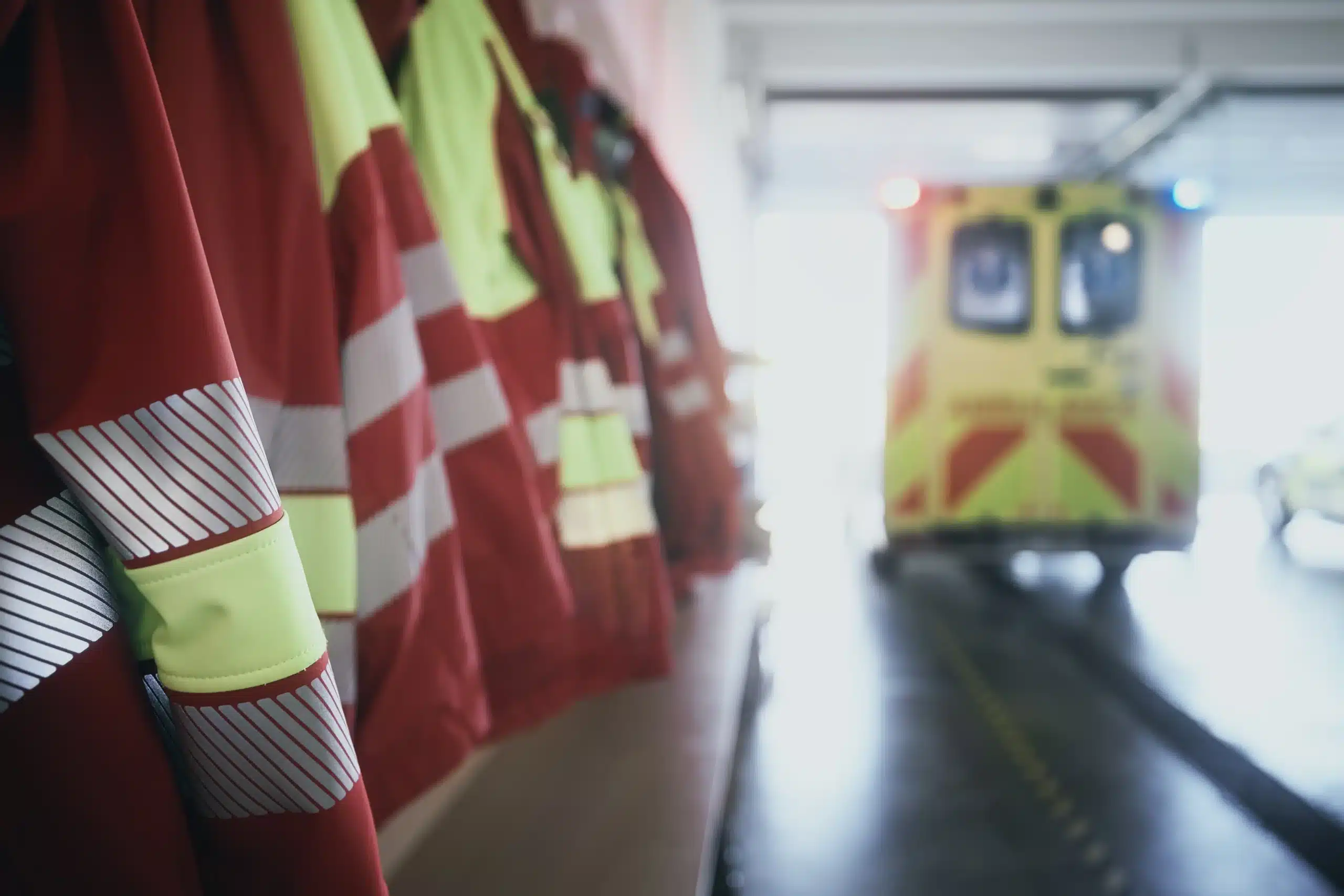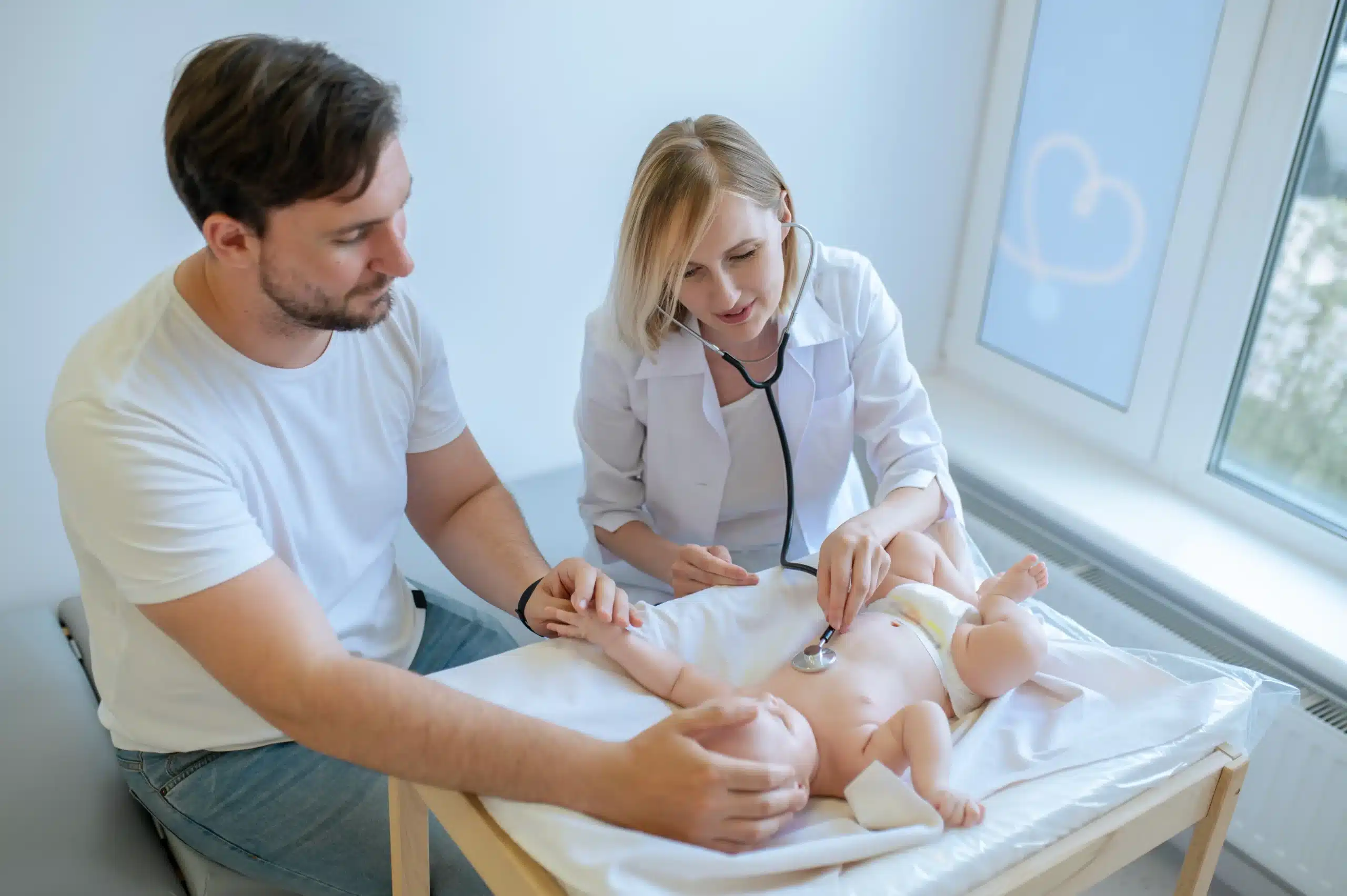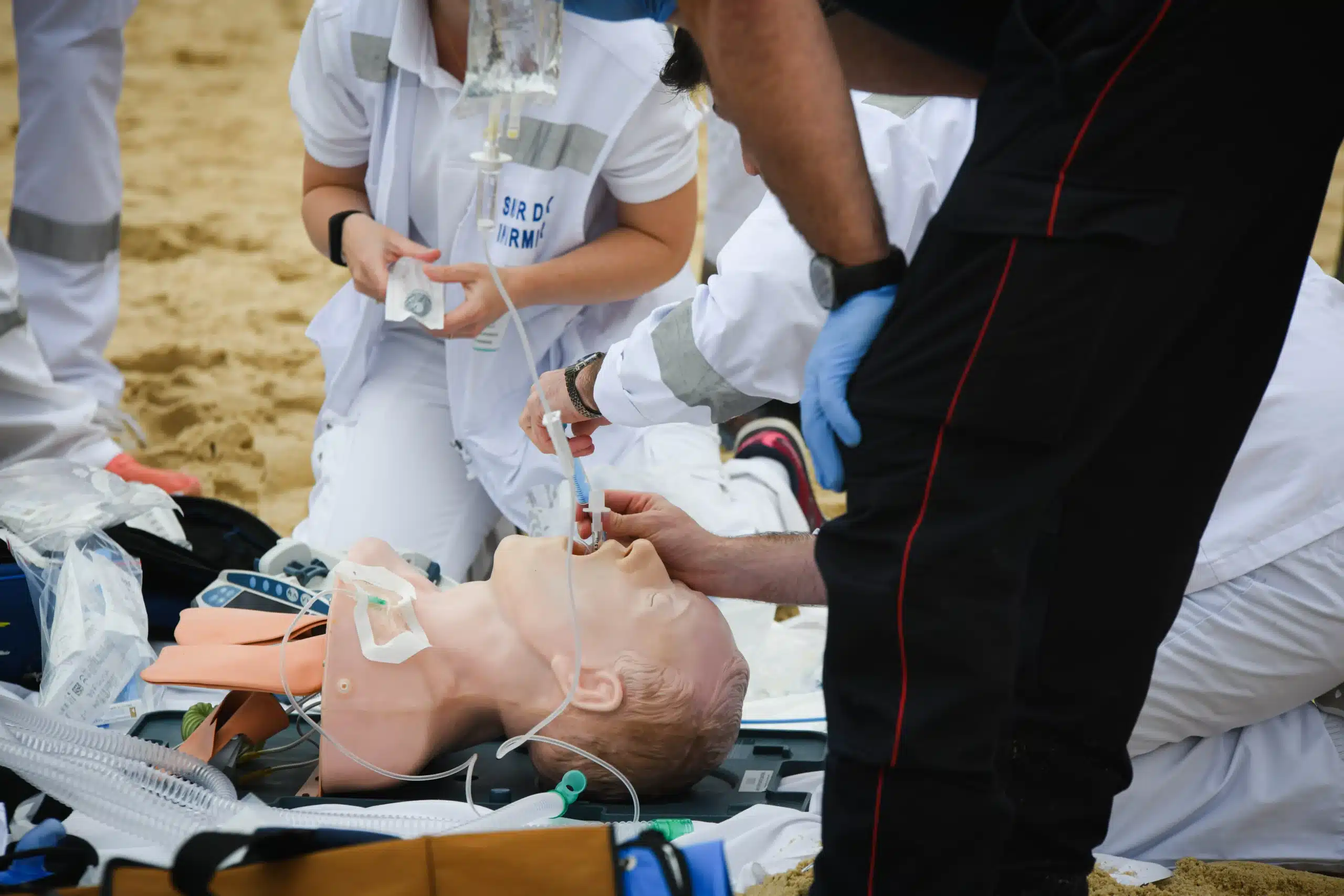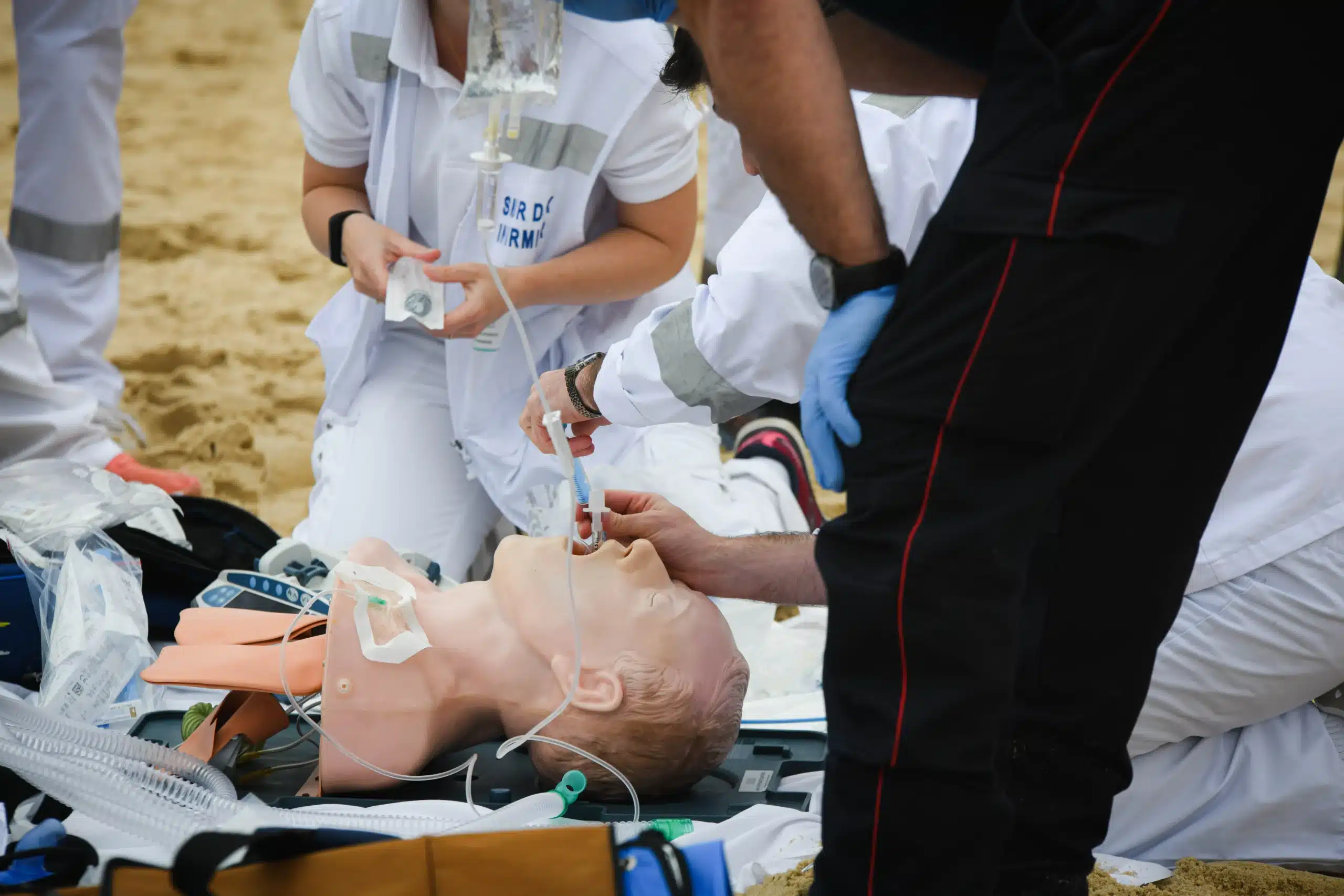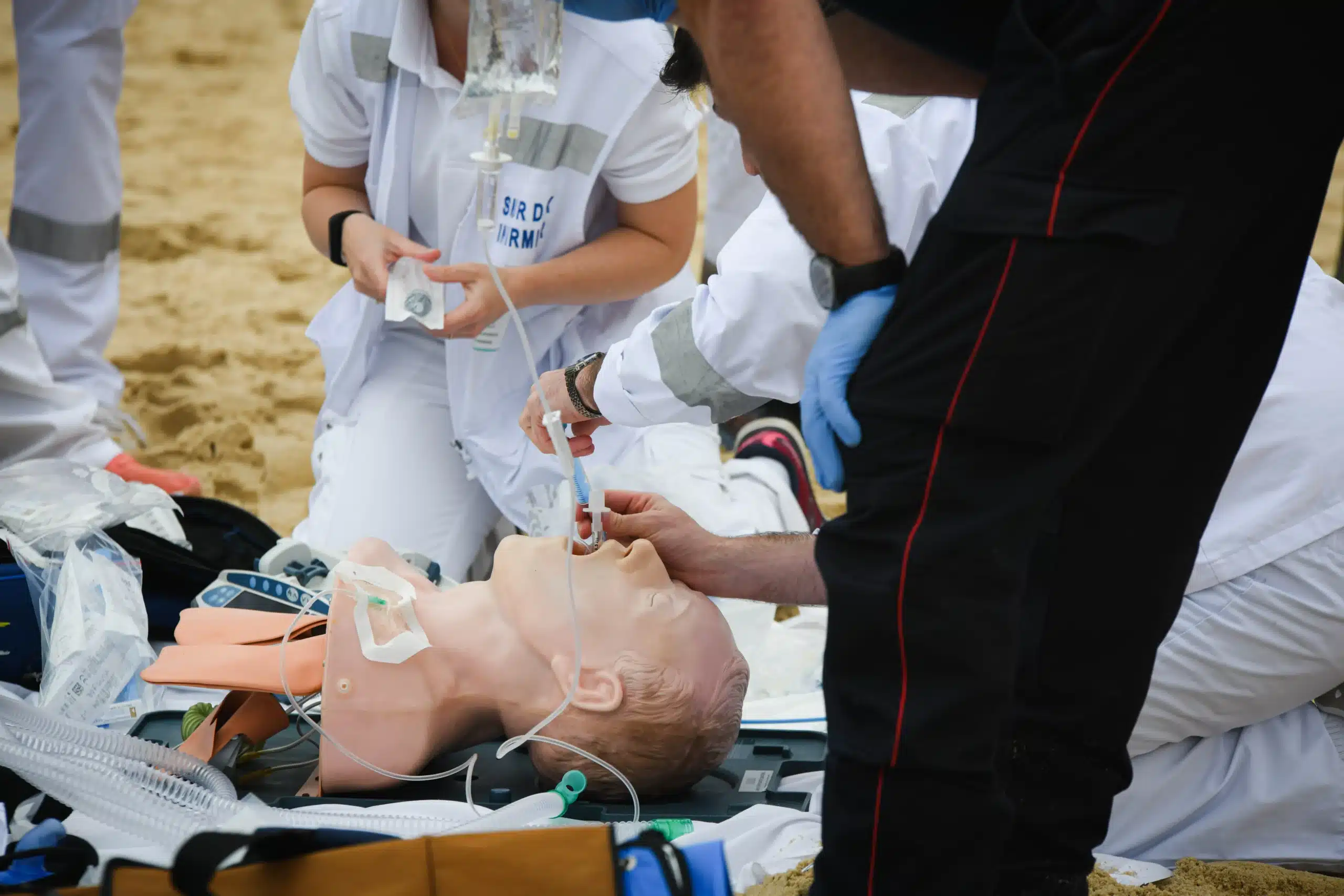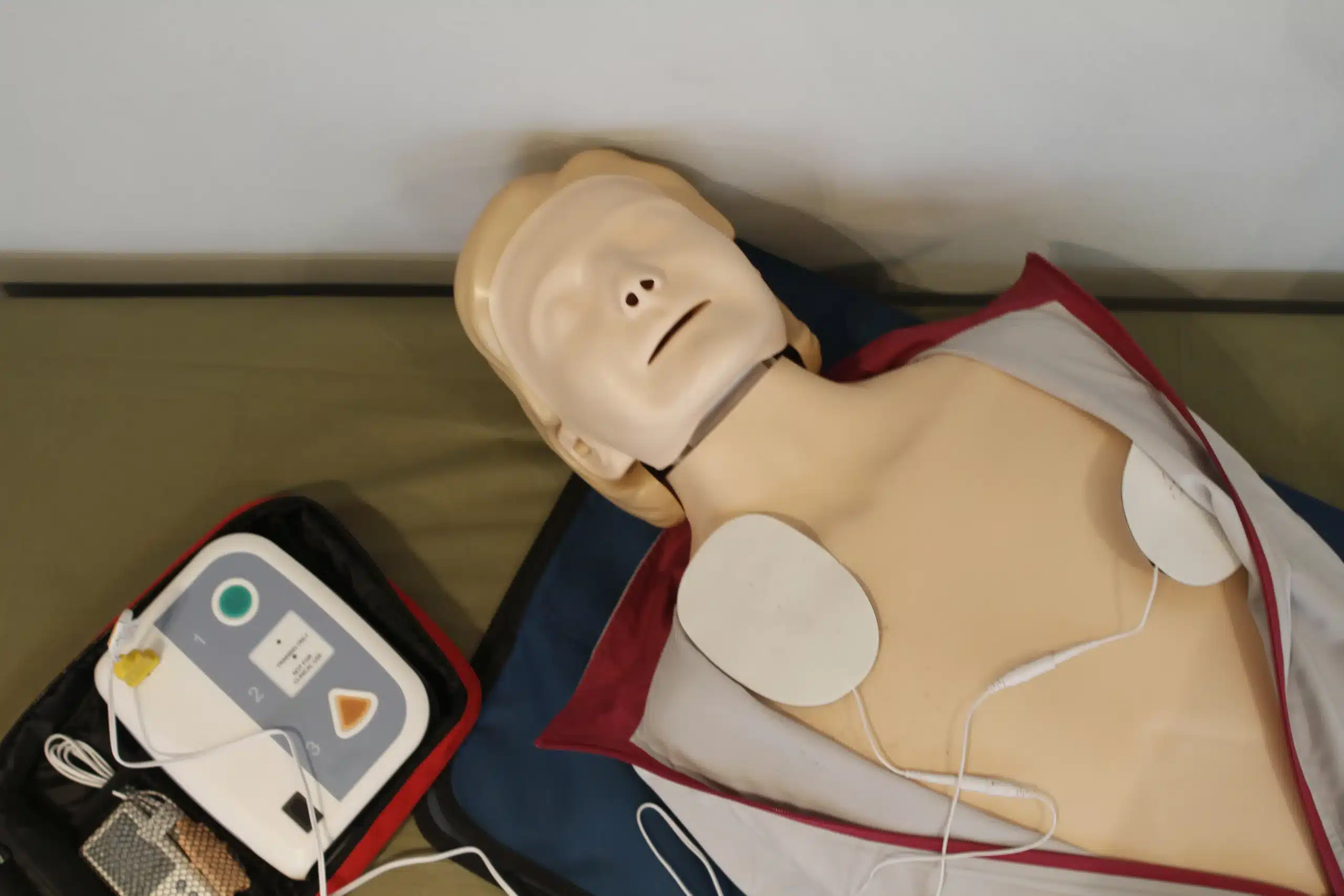Working as a nurse in Pleasanton means being prepared for anything, especially when it comes to cardiovascular emergencies. ACLS courses for nurses in Pleasanton offer the advanced training you need to confidently manage these critical situations. This certification is more than just a credential; it’s a testament to your commitment to providing the highest quality patient care. In this guide, we’ll explore the importance of ACLS for nurses, covering the essential skills, debunking common myths, and outlining the certification process. We’ll also delve into specialized scenarios you might encounter and provide resources to support your ongoing learning journey. Whether you’re considering ACLS certification for the first time or looking to renew your existing credentials, this guide will provide you with the information and resources you need to succeed.
Key Takeaways
- ACLS is essential for nurses: It provides advanced life-saving skills beyond basic CPR, empowering confident management of complex cardiovascular emergencies and improving patient outcomes.
- Choose the right ACLS course: Consider location, schedule, cost, and learning style (online, in-person, or blended). Seek AHA-certified courses with resources like practice scenarios and continuing education. Pleasanton CPR Classes offers various affordable options.
- Maintain your ACLS skills: Stay updated on the latest guidelines and advancements through refresher courses and continuing education. Regularly review protocols and research to provide the best patient care.
What is ACLS? Why it Matters for Nurses
As a nurse, you’re on the front lines of patient care, and in critical situations, seconds can matter. That’s where Advanced Cardiovascular Life Support (ACLS) comes in. This specialized training equips healthcare professionals with the skills to manage life-threatening cardiovascular emergencies. It’s a core component of emergency medical care, giving you the knowledge and tools to respond effectively when a patient’s life hangs in the balance. If you’re involved in emergency cardiac care, understanding ACLS is essential for providing the best possible patient outcomes.
What is ACLS?
ACLS certification goes beyond basic life support, like CPR. It focuses on a systematic approach to managing cardiopulmonary arrest and other cardiovascular emergencies. This advanced training covers a range of interventions, from recognizing and treating arrhythmias to managing airways and administering medications. It’s a comprehensive program designed to enhance your critical thinking and decision-making skills in high-pressure situations. ACLS certification is relevant for various medical professionals, including nurses, paramedics, and respiratory therapists.
Essential ACLS Skills
ACLS courses cover essential skills, including electrocardiogram (ECG) interpretation, airway management, and medication administration. You’ll learn the American Heart Association’s (AHA) algorithms for managing cardiac emergencies, providing a structured framework for your responses. But ACLS isn’t just about memorizing algorithms; it’s about applying them in dynamic, real-world scenarios. ACLS training prepares you for the unpredictable nature of emergencies, honing your ability to assess, prioritize, and act decisively.
Debunking ACLS Course Myths
One common misconception is that ACLS certification is only for doctors. In reality, nurses play a crucial role in cardiac emergencies, making ACLS certification just as vital for them. While CPR is a foundational skill, ACLS builds upon that foundation, providing a deeper understanding of cardiovascular emergencies and advanced interventions. It empowers nurses to take a more active role in leading and coordinating care during these critical events.
Find Your ACLS Course in Pleasanton
Pleasanton offers a variety of options for nurses seeking ACLS certification or recertification. Whether you prefer online, in-person, or blended learning, you can find a course that fits your schedule and learning style. Here’s a rundown of local providers and resources:
Safety Training Seminars
Safety Training Seminars, a woman-owned business, offers American Heart Association-certified classes in BLS, ACLS, PALS, and First Aid/CPR. They also provide courses from EMSA, giving you a wide range of options. Conveniently located in Pleasanton, they offer group discounts, helpful if you’re training with colleagues. Their commitment to customer service and a low price guarantee make them a popular choice.
Bay Area CPR
Bay Area CPR provides AHA-certified courses in BLS, ACLS, PALS, and CPR in Pleasanton. They focus on equipping healthcare providers with the skills they need in emergencies.
American Heart Association Training Centers
The American Heart Association offers various ACLS courses throughout the Bay Area. Many courses use a blended learning format, combining online coursework with in-person skills sessions—a great option for busy professionals. You can find AHA-certified training centers on their website.
Red Cross Training Centers
The American Red Cross also offers BLS and ACLS/ALS certifications. Their blended learning approach combines online modules with hands-on skills practice.
Other Local Providers
You might find other local options for ACLS training beyond these major providers. When choosing, consider factors like location, schedule, cost, and the learning environment. Safety Training Seminars, for example, serves Pleasanton, Dublin, and San Ramon, a convenient option for nurses in the Tri-Valley area. Always verify that the provider offers AHA-certified courses if required for your job.
Choose Your ACLS Learning Format
As a nurse, your schedule is demanding. Finding the right ACLS course format is key to successfully completing your training. Let’s break down online, in-person, and blended learning options.
Online Learning
Online ACLS courses offer incredible flexibility. You can study at your own pace, fitting coursework around your shifts and personal life. This format is perfect if you prefer self-directed learning and need to squeeze in study time whenever you can. However, online learning may not provide the same level of hands-on practice as in-person training. If you learn best by doing, consider supplementing your online coursework with additional practice sessions.
In-Person Training
In-person ACLS training provides a structured learning environment with direct interaction with instructors and classmates. You’ll have opportunities for hands-on practice and receive immediate feedback, which is essential for mastering critical skills. This format is ideal for those who thrive in a traditional classroom setting and value face-to-face instruction. However, in-person classes require a fixed schedule, which can be challenging for nurses with rotating shifts. Pleasanton CPR Classes offers in-person ACLS training in Pleasanton.
Blended Learning
Blended learning combines online learning flexibility with the hands-on experience of in-person training. You’ll complete online modules at your own pace, then attend a skills session for practical application and assessment. The American Heart Association’s RQI program is a popular example of blended learning, offering a streamlined path to BLS, ACLS, and PALS certification. This format is a great option for nurses seeking a balance of convenience and hands-on learning. For more information on available courses, visit the Pleasanton CPR Classes website.
ACLS Course Prerequisites & Requirements
Before you sign up for an ACLS course, make sure you have these prerequisites covered. Understanding the requirements beforehand will make your registration process smoother.
BLS Certification
You’ll need a current Basic Life Support (BLS) certification before starting ACLS. This foundational knowledge is crucial for building advanced cardiac life support skills. Think of it as the essential first step. Many providers require you to bring your BLS for Healthcare Providers card to class, so keep it handy. Pleasanton CPR Classes offers BLS certification courses if you need to obtain or renew your BLS certification.
ACLS Provider Manual
Along with your BLS certification, you’ll need the current edition of the ACLS Provider Manual. This manual is your go-to resource during the course, packed with information and guidelines you’ll use throughout your training. Having it on hand will help you follow along and get the most out of your class. You can purchase the manual directly from the American Heart Association.
Renewing Your Certification
It’s important to remember that ACLS certification isn’t a one-and-done deal. Like many certifications in healthcare, it expires and requires renewal to stay current with the latest advancements in ACLS. Recertification ensures healthcare providers stay up-to-date. Plan to recertify regularly to maintain your skills and knowledge. Check with your certifying organization, such as the American Heart Association, for renewal requirements and options. Pleasanton CPR Classes also offers renewal courses to help you maintain your certification.
ACLS Course Costs & Value
When you’re ready to commit to an ACLS course, understanding the total investment and what’s included is essential. Let’s break down the typical costs associated with ACLS certification and explore ways to find the best value.
Course Fees & Inclusions
Generally, an ACLS course bundles everything you need for certification. This includes the online portion, the hands-on skills testing session, and your official ACLS provider certification card. You can expect the total cost to be around $290 for this comprehensive package. This upfront pricing ensures there are no surprises along the way. Pleasanton CPR Classes offers ACLS training that follows this pricing structure.
Additional Costs
While the initial course fee covers a lot, it’s important to be aware of potential additional expenses. For example, rescheduling your course typically incurs a $30 fee for each change. This fee helps maintain the efficiency of the courses and ensures instructors can adequately prepare for each session. Be sure to review the course preparation information to understand these policies.
Nurse Discounts & Promotions
We know cost is a factor, especially for nurses balancing professional development with busy schedules. Pleasanton CPR Classes offers a low price guarantee and often has group discounts, making high-quality training more accessible. These discounts can be a great way to save, especially if you’re coordinating training with colleagues. For more tips on finding affordable options, check out our guide on CPR classes. Safety Training Seminars also serves Pleasanton and offers a low price guarantee, providing another option for competitively priced ACLS training. Learn more about their offerings in our ACLS HeartCode overview.
Choose the Right ACLS Course
Finding the right ACLS course involves more than just picking a provider. It’s about finding the best fit for your learning style, schedule, and career goals. This section breaks down key factors to consider when making your decision.
Key Provider Selection Factors
Think about what matters most to you in a learning environment. Is it a convenient location? A flexible schedule? Or perhaps a provider known for excellent instruction and support? Safety Training Seminars, for example, offers a low price guarantee and serves Pleasanton, Dublin, and San Ramon. This makes them a convenient option for nurses in the Tri-Valley area. Consider factors like these when choosing your provider. Do a little research—read reviews and compare what different training centers offer. A provider’s reputation and commitment to student success can significantly impact your learning experience.
Compare Course Features & Benefits
ACLS courses aren’t all created equal. Some providers offer more comprehensive training materials, while others focus on hands-on practice. In-person ACLS courses provide valuable opportunities for real-time interaction with instructors and peers, allowing for immediate feedback. Online courses, on the other hand, offer flexibility for busy professionals. Consider what each course includes—exam fees, study materials, and continuing education credits. These details can make a difference in your overall learning experience and long-term career development.
Prepare for Your ACLS Course
Before you start your ACLS training, take some time to prepare. Review any course prerequisites, such as having a current BLS certification. Familiarize yourself with the ACLS provider manual and any pre-course reading. This preparation will help you get the most out of your training. Also, think about your learning style. Do you learn best in a traditional classroom setting or through independent study? Choosing a course format that aligns with your learning preferences will set you up for success. This thoughtful preparation can make a real difference in your confidence and competence as you progress through the course.
Specialized ACLS Scenarios for Nurses
As a nurse, you’re on the front lines of patient care, and ACLS certification equips you for high-stakes situations. It goes beyond basic CPR to encompass a range of complex medical emergencies. Let’s look at some specialized scenarios you might encounter and how ACLS training at Safety Training Seminars prepares you.
Manage Cardiac Arrest
Cardiac arrest requires immediate and decisive action. ACLS training provides the skills to manage these critical events, from initial assessment and CPR to advanced interventions like defibrillation and medication administration. Realistic simulations during training help build confidence and improve response times in actual emergencies. These scenarios often involve ECG interpretation, allowing you to quickly identify arrhythmias and implement appropriate treatment protocols.
Handle Respiratory Emergencies
Respiratory emergencies can quickly escalate, demanding prompt intervention. ACLS training covers various respiratory scenarios, including airway management techniques, oxygen administration, and mechanical ventilation. You’ll learn to assess respiratory distress, identify the underlying causes, and provide appropriate respiratory support. This expertise is crucial for stabilizing patients and preventing further complications. For more information on our ACLS courses, visit our website.
Recognize & Treat Arrhythmias
Recognizing and treating cardiac arrhythmias is a cornerstone of ACLS. You’ll gain a deep understanding of ECG interpretation, enabling you to identify different arrhythmias and implement appropriate treatment algorithms. ACLS training covers a wide range of arrhythmias, from bradycardia and tachycardia to more complex life-threatening rhythms like ventricular fibrillation. This knowledge is essential for effective management and improved patient outcomes. Take advantage of our low price guarantee on ACLS certification.
Provide Post-Cardiac Arrest Care
Post-cardiac arrest care is just as critical as the initial response. ACLS training emphasizes the importance of post-resuscitation care, including hemodynamic support, temperature management, and neurological assessment. You’ll learn how to optimize ventilation and oxygenation, manage electrolyte imbalances, and identify potential complications. This comprehensive approach to post-arrest care improves the chances of a positive recovery for your patients. Consider our group discounts if you’re registering with colleagues.
Register & Schedule Your ACLS Course
Getting your ACLS certification or recertification is straightforward. This section walks you through registration, scheduling, and finding discounts.
Registration Steps
Pleasanton CPR Classes makes signing up for an ACLS course easy. Check their low price guarantee—they proudly serve Pleasanton, Dublin, and San Ramon. You can typically register online, choosing a date and time that works for you. Some providers may also allow registration by phone or email. Have your BLS certification information handy, as that’s often a prerequisite for ACLS training. For a comprehensive guide to ACLS courses in Pleasanton, take a look at this helpful resource.
Flexible Scheduling
Juggling work and life as a nurse can be tough, so finding a course that fits your schedule is key. Luckily, there are plenty of options. Pleasanton CPR Classes offers courses daily, accommodating various schedules and preferences. Some healthcare professionals appreciate the hands-on learning of in-person classes, while others value the flexibility of online learning. Explore different formats to find what works best for you. For more insights on choosing the right class format, check out this guide.
Group Discounts
If you’re training with colleagues, ask about group discounts. Pleasanton CPR Classes often offers discounted rates for groups, making it more affordable to get certified together. This can be a great option for hospitals or clinics looking to train their nursing staff. This resource offers more information on group discounts and other valuable tips. Bundling certifications, like CPR and First Aid, can also lead to cost savings. Check out these combined courses for more information.
Maintain Your ACLS Certification
Keeping your Advanced Cardiovascular Life Support (ACLS) skills sharp is essential for any healthcare provider, especially nurses. It’s not a one-and-done deal; staying current with the latest guidelines ensures you’re prepared to deliver the best possible patient care. This section covers how to maintain your ACLS certification and why it’s so important.
Renewal Process
ACLS certification isn’t permanent. It typically expires after two years, requiring recertification to stay up-to-date with the latest advancements in ACLS. The renewal process usually involves completing a refresher course, either online or in person, covering core ACLS algorithms and protocols. Check with your certifying body, such as the American Heart Association, for specific renewal requirements and available courses. Don’t let your certification lapse—stay ahead and schedule your renewal in advance.
Continuing Education
Maintaining your ACLS certification is crucial for healthcare professionals. Continuing education opportunities, like workshops and online modules, can help you build on your existing knowledge and refine your skills. These resources often cover emerging trends, new research, and changes to treatment protocols, ensuring you’re always practicing with the most current information. Look for ACLS-related continuing education offered by reputable organizations like the American Heart Association or professional nursing associations. Staying informed about the latest guidelines is essential for providing effective ACLS.
Stay Updated on Guidelines
The American Heart Association (AHA) periodically updates its guidelines for cardiopulmonary resuscitation (CPR) and emergency cardiovascular care (ECC), which includes ACLS protocols. These updates reflect new scientific evidence and best practices, so it’s vital to familiarize yourself with any changes. Resources like the AHA’s HeartCode ACLS course incorporate the latest guidelines, ensuring you’re learning the most up-to-date information. You can also visit the AHA website for the most recent guideline updates and other helpful resources.
Beyond Certification: Resources & Support
Getting your ACLS certification is a huge accomplishment, but your learning journey doesn’t end there. Staying sharp and up-to-date is key to providing the best possible patient care. Thankfully, plenty of resources are available to support you throughout your career.
Online Refresher Courses
Juggling work, family, and everything else can make finding time for traditional classroom learning tough. Online refresher courses offer a flexible way to brush up on your ACLS skills and knowledge whenever it suits you. These courses cover essential concepts and updates, fitting easily into even the busiest schedules. Providers like ACLS.com offer convenient online ACLS certification programs designed for nurses.
Advanced Life Support Modules
Ready to take your expertise to the next level? The American Heart Association (AHA) offers Advanced Life Support (ALS) Modules for experienced healthcare providers like physicians, nurses, and paramedics working in critical care settings. These modules delve into specialized topics and advanced techniques, building upon the core ACLS curriculum. You can explore the AHA’s ALS Modules to see what fits your needs.
Access Protocols & Research
Staying current with the latest research and treatment protocols is crucial in the ever-evolving world of healthcare. ACLS training emphasizes the AHA’s algorithms for managing cardiac emergencies, providing a strong foundation for real-world scenarios. Resources like the ACLS Academy offer insights into how ACLS training prepares you for these situations. Regularly reviewing updated protocols and research ensures you’re equipped to deliver the most effective care. Staying informed about ACLS advancements is a key part of maintaining your certification and providing top-notch patient care.
Related Articles
- ACLS Certification in Dublin: Your Complete Guide – Pleasanton CPR Classes
- ACLS Certification in San Ramon: Your Complete Guide – Pleasanton CPR Classes
- ACLS HeartCode in Pleasanton: The Complete Guide – Pleasanton CPR Classes
Frequently Asked Questions
Why is ACLS certification important for nurses? Nurses are essential members of any team responding to a cardiac or respiratory emergency. ACLS equips nurses with the advanced skills to assess, stabilize, and manage patients during these critical events, leading to better patient outcomes. It empowers nurses to take a more active role in leading and coordinating care, contributing significantly to a patient’s chance of survival.
What’s the difference between BLS and ACLS? BLS (Basic Life Support) focuses on immediate life-saving techniques like CPR, while ACLS (Advanced Cardiovascular Life Support) builds upon those skills. ACLS delves into more complex situations, such as arrhythmia recognition and treatment, advanced airway management, and post-resuscitation care. Think of BLS as the foundation, and ACLS as the next level of expertise.
How can I fit ACLS training into my busy schedule? Many ACLS providers understand the demands of a nursing career and offer flexible training options. Online courses allow self-paced learning, while blended learning combines online modules with shorter in-person skills sessions. In-person classes are also available, often scheduled to accommodate various work shifts. Look for a provider that offers a format that suits your needs and availability.
What are the typical costs associated with ACLS certification? ACLS course fees generally cover the training materials, skills testing, and certification card. Expect to pay around $290 for a comprehensive package. Keep in mind that additional fees may apply for rescheduling or other administrative changes. Look for providers offering discounts, especially for groups or combined certifications, to make the training more affordable.
How do I maintain my ACLS certification after completing the course? ACLS certification typically requires renewal every two years. You’ll need to complete a recertification course to stay current with the latest guidelines and maintain your skills. Continuing education opportunities, such as workshops and online modules, can also help you stay up-to-date on advancements in ACLS and further develop your expertise.
